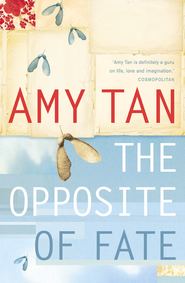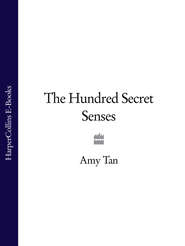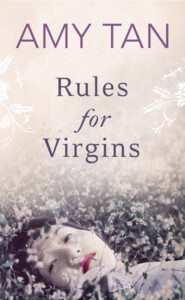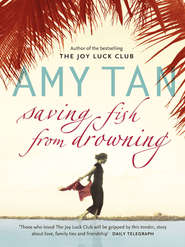По всем вопросам обращайтесь на: info@litportal.ru
(©) 2003-2024.
✖
The Valley of Amazement
Автор
Год написания книги
2018
Настройки чтения
Размер шрифта
Высота строк
Поля
A Western wedding had its advantages, as I had already learned from having attended a Chinese version for a courtesan at another house. For one thing, it did not involve honoring ancestors, who certainly would have disavowed a courtesan as his descendant. So there were no boring rituals or kneeling and endless bowing. The ceremony was short. The prayers were omitted. The bride said “I do” and the groom said “I do.” Then it was time to eat. The banquet food at a Western wedding was also remarkable because all the dishes looked Western but they tasted Chinese.
For different fees, patrons could choose music from among several styles. Yankee music played by a marching band was the most expensive and suitable only during good weather. A Yankee violinist was a cheaper choice. Then there was a choice of music. It was important to not be fooled by the title of a song. One of the courtesans had asked the violinist to play “O Promise Me,” thinking the length of the song would strengthen her patron’s fidelity and perhaps increase the length of the contract. But the song went on for so long that guests lost interest and talked about other matters until the song ended. That was the reason the contract was not renewed, the flower sisters later said. Everyone liked “Auld Lang Syne,” played with the aching power of a Chinese instrument that looked like a miniature two-stringed cello. Even though the tune was sung on sad occasions, such as funerals and farewells, it was still popular. There were only a few English words to learn, and everyone loved to sing them to prove they could speak English. My mother changed the words to reflect a promise of monogamy. If a courtesan broke that promise, it would lead to the end of the contract, as well as a bad reputation that would be hard to overcome. If, however, the patron was the one who broke the promise, the courtesan would feel humiliated. Why had he dishonored her? There must have been a reason.
Prosper, who fancied he was a Chinese Caruso, sang with gusto.
“Should old lovers be forgot,
And never brought to mind!
Should old lovers be forgot,
For a long, long time.
Clang bowls again, my dear old friends,
Clang bowls one more time.
Should old lovers be forgot,
And never come to mind!”
In the middle of the song, I saw Magic Cloud turn her eyes toward the archway. She touched her arm lightly, looked up again, and smiled. A moment later, I felt the familiar coolness blow over my arm and down my spine. I shivered and went to my mother.
Prosper bellowed out the last note and let the clapping go on for too long, and then he called for the gifts to be brought to Billowy Cloud. First came the traditional gift every courtesan received: a silver bracelet and a bolt of silk—a toast to that! The guests raised their cups, tipped their heads back, and downed the wine in one swallow. Next came a Western settee upholstered in pink sateen—two toasts for that! More gifts came. Finally Prosper handed Billowy Cloud what she wanted most, an envelope of money, the first of her monthly stipend. She saw the amount, gasped, and fell speechless as tears streamed down her face. We would not know until later if her tears were because she received more than she had expected or less. Another toast was raised. Billowy Cloud insisted she could not drink another. Her face wore splotches of red and she said she felt the ceiling lurching one way and the floor the other. But Prosper grabbed her chin and forced down the wine, followed immediately by another as his friends egged him on. All at once, Billowy Cloud gurgled and vomited before she collapsed to the floor. Golden Dove quickly signaled the musician for a final song to hurry the guests out of the room, and Prosper left with them, without a glance toward Billowy Cloud, who lay on the floor, babbling apology. Magic Cloud tried to sit her up, but the senseless girl flopped backward like a dead fish. “Bastards,” Golden Dove said. “Put her in a tub and make sure she doesn’t drown.”
I saw many weddings. The younger beauties had contracts one after another, with hardly a week in between. But as they grew older and their eyes sparkled less, there were no more weddings for them. And then came the day when Golden Dove told a beauty she had to “take the sedan,” which was a polite way of saying she was being evicted. I remembered the day that Rosy Cloud was given the bad news. Mother and Golden Dove had her come to the office. I was studying in Boulevard, the room on the other side of the glass French doors. I heard Rosy Cloud’s voice growing louder. Golden Dove was citing figures of money, declining bookings. Why was I able to hear this so clearly? I went to the door and saw that it was not completely closed. There was a half-inch opening. I heard Rosy Cloud beg quietly to stay longer, citing that a certain suitor was on the brink of offering to be her patron. But they held firm and were without sympathy. They suggested another house she might join. Rosy Cloud became loud and angry. They were insulting her, she said, as if she were a common whore. She ran out. A few minutes later I heard her howl in the same way Carlotta did when her foot was caught in the doorjamb, as if her voice was coming from both her bowels and her heart. The sound of it sickened me.
I told Magic Cloud what had happened to Rosy Cloud.
“This will happen to all of us. One day fate brings us here,” she said. “Another day it takes us away. Maybe her next life will be better. Suffer more now, suffer less later.”
“She shouldn’t suffer at all,” I said.
Within three days, a courtesan named Puffy Cloud was in Rosy Cloud’s quarters. She knew nothing of what had gone on in that room—not the bouncing, the sighs, the tears, or the howls.
A few weeks later, I was in Magic Cloud’s boudoir in the late afternoon. Mother had been too busy to eat her late-midday meal with me. She had to dash off to some unknown place to meet an unnamed person. Magic Cloud was putting powder on her face, preparing for a long night—three parties, one at Hidden Jade Path, the other two at houses several blocks away.
I was full of questions. “Are those real pearls?” “Who gave them to you?” “Who will you see tonight?” “Will you bring him to your room?”
She told me that the pearls were the teeth of dragons and a duke had given them to her. He was honoring her tonight, and naturally she would bring him to her room for tea and conversation. I laughed, and she pretended to be offended that I did not believe her.
The next morning she was not in her room. I knew something was wrong because her scholar treasures and silk quilt were missing. I peered into her wardrobe closet. It was empty. Mother was still asleep, as were the courtesans and Golden Dove. So I went to Cracked Egg, the gatekeeper, and he said that he saw her leave but did not know where she had gone. I learned the answer when I overheard two maids talking:
“She was at least five or six years older than she said she was. What house would take an old flower with a ghost stuck inside her?”
“I overheard Lulu Mimi telling the patron it was just superstitious nonsense. He said it didn’t matter if it was a ghost or a living man, it was infidelity and he wanted the contract money back.”
I raced into my mother’s office and found her talking to Golden Dove.
“I know what she did and she’s sorry. You have to let her come back,” I said. Mother said there was nothing more to be done. Everyone knew the rules, and if she made an exception for Magic Cloud, all the beauties might think they could do the same without penalty. She and Golden Dove went back to discussing plans for a large party and how many extra courtesans would be needed.
“Mother, please,” I begged. She ignored me. I burst into tears and shouted: “She was my only friend! If you don’t bring her back, I will have no one who likes me.”
She came to me and drew me close, caressing my head. “Nonsense. You have many friends here. Snowy Cloud—”
“Snowy Cloud doesn’t let me come into her room the way Magic Cloud did.”
“Mrs. Petty’s daughter—”
“She’s silly and boring.”
“You have Carlotta.”
“She’s a cat. She doesn’t talk to me or answer questions.”
She mentioned the names of more girls who were the daughters of her friends, all of whom I now claimed I disliked—and who despised me, which was partially true. I carried on about my friendless state and the danger of my permanent unhappiness. And then I heard her speak in a cold unyielding tone: “Stop this, Violet. I did not remove her for small reasons. She nearly ruined our business. It was a matter of necessity.”
“What did she do?”
“By thinking only of herself, she betrayed us.”
I did not know what betrayed meant. I simply sputtered in frustration: “Who cares if she betrayed us?”
“Your very mother before you cares.”
“Then I will always betray you,” I cried.
She regarded me with an odd expression, and I believed she was about to give in. So I pushed again with my bravado. “I’ll betray you,” I warned.
Her face contorted. “Stop this, Violet, please.”
But I could not stop, even though I knew that I was unleashing an unknown danger. “I’ll always betray you,” I said once more and immediately saw a shadow fall over my mother’s face.
Her hands were shaking and her face was so stiff she appeared to be a different person. She said nothing. The longer the silence grew, the more frightened I became. I would have backed down if I had known what to say or do. So I waited.
At last she turned, and as she walked away, she said in a bitter voice, “If you ever betray me, I shall have nothing to do with you. I promise you that.”
MY MOTHER HAD a certain phrase she used with every guest, Chinese or Western. She would walk hurriedly to a certain man and whisper excitedly, “You’re just the one I hoped to see.” Then followed the dip of her head toward the man’s ear to whisper some secret, which caused the man to nod vigorously. Some kissed her hand. This repeated phrase distressed me. I had noticed that she was often too busy to pay any attention to me. She no longer played the guessing games or sent me on treasure hunts. We no longer lay in her bed cuddled next to each other as she read the newspaper. She was too busy for that. Her gaiety and smiles were now reserved for the men at her parties. They were the ones she had hoped to see.
One night, as I crossed the salon with Carlotta in my arms, I heard Mother call out: “Violet! You’re here. You’re just the one I hoped to see.”
At last! I had been chosen. She gave profuse apologies to the man she had been conversing with, citing that her daughter required her urgent attention. What was so urgent? It did not matter. I was excited to hear the secret she had saved for me. “Let’s go over there,” Mother said, nudging me toward a dark corner of the room. She took my arm in hers, and we were off at a brisk pace. I was telling her about Carlotta’s latest antics, something to amuse her, when she let go of my arm, and said, “Thank you, darling.” She walked over to a man in the corner of the room and said, “Fairweather, my dear. I’m sorry I was delayed.” Her dark-haired lover stepped out of the shadows and kissed her hand with fake gallantry. She returned a crinkle-eyed smile I had never seen her give to me.
I could not breathe, crushed by my short-lived happiness. She had used me as her pawn! Worse, she had done so for Fairweather, a man who had visited her from time to time, and whom I had always disliked. I had once believed I was the most important person in her life. But in recent months, that was disproved. Our special closeness had become unmoored. She was always too busy to spend time chatting with me during her midday meals. Instead she and Golden Dove used that hour to discuss the evening plans. She seldom asked me about my lessons or what I was reading. She called me “darling,” but she said the same to many men. She kissed my cheek in the morning and my forehead at night. But she kissed many men, and some on the mouth. She said she loved me, but I did not see any particular sign of that. I could not feel anything in my heart but the loss of her love. She had changed toward me, and I was certain that it had started the day when I threatened to betray her. Bit by bit, she was having nothing to do with me.
Golden Dove found me crying one day in Boulevard. “Mother does not love me anymore.”
“Nonsense. Your mother loves you a great deal. Why else does she let you go unpunished for all the naughty things you do? Just the other day, you broke a clock by moving its hands backward. You ruined a pair of her stockings by using it as a mouse for Carlotta to chase.”










